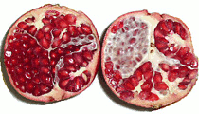Wednesday, July 1, 2015
POMEGRANATE - HEALTH FRUITS
Pomegranate (Punica granatum) or BUAH DELIMA in Malay are exotic fruits and nutritious. Pomegranate fruit is one of the most popular, nutritionally rich fruit with unique flavor, taste, and heath promoting characteristics. The tree was categorised as deciduous tree belonging within the Lythraceae family from genus Punica and the fruit is thought to originate in the Sub-Himalayan range of North India. There are no report from DOA about the planting of this fruit in Malaysia but I estimated less than 20 hectare CHE respectively. Most pomegranate fruits are planted as a hobby by those who rally know the technology and able to buy the planting materials. One pomegranate fruits weighed about 200 - 300 gram priced at RM10.-00 - RM12.00 per fruit at IOI Shopping Mall, Putrajaya. Many health drinks for beautification of skin are formulated from this fruit extracts. The product claims that this health drinks able to promote health and whiter skin colour. This plant are rare to many local farmers. Along with sub-arctic pigmented berries and some tropical exotics such as mango, it too has novel qualities of functional foods, often called as “super fruits.” Botanically the matured tree are able to produce a small size
fruit-bearing.
Pomegranate tree grows to about five
and eight meters tall (See next picture). It is cultivated at a commercial scale in vast regions across Indian sub-continent, Iran, Caucuses, and Mediterranean regions for its fruits. Completely grown-up tree bears numerous spherical, bright red, purple, or orange-yellow coloured fruits depending on the cultivar types. Each fruit measures about 6-10 cm in diameter and weighs about 200 gm. Its tough outer skin (rind) features leathery texture. Interior of the fruit is separated by white, thin, spongy, membranous, bitter tissue into discreet compartments. Such sections, packed as sacs, filled with tiny edible sweet, juicy, pink pulp encasing around a single, angular, soft or hard (in case of over mature fruits) seed. The red ripe fruits are easily harvested manually or mechanised.
Health benefits of Pomegranate are nutririous fruit known from decade ago. The fruit is moderate in calories; 100 g provides 83 calories, slightly more than that in the apples. It contains no cholesterol or saturated fats. It is a good source of soluble and insoluble dietary fibers, providing about 4 g per 100 g (about 12% of RDA), which aid in smooth digestion and bowel movements. The fruit is suggested by nutritionists in the diet for weight reduction and cholesterol controlling programs. Regular inclusion of fruits in the diets boosts immunity, improves circulation, and offers protection from cancers. Certain ellagitannin compounds such as Granatin B, and Punicalagin are found abundantly in the pomegranate juice. Studies suggest that punicalagin and tannins are effective in reducing heart-disease risk factors by scavenging harmful free radicals from the human body. Total antioxidant strength of pomegranate fruit measured in terms of its oxygen radical absorbance capacity (ORAC) is 2341 µmol TE/100 g. The fruit is an also good source of antioxidant vitamin-C, provides about 17% per 100 g of daily requirement. Consumption of fruits rich in vitamin C helps the body develop resistance against infectious agents by boosting immunity. Regular consumption of pomegranate has also been found to be effective against prostate cancer, benign prostatic hyperplasia (BPH), diabetes, and lymphoma. Further, it is an also good source of many vital B-complex groups of vitamins such as pantothenic acid (vitamin B-5), folates, pyridoxine and vitamin K, and minerals like calcium, copper, potassium and manganese.
According to many reports, world’s best pomegranates are grown in the southern states of Afghanistan in Kandahar, Balkh, Helmand and Nimruz provinces (See picture). The pomegranate fruit is judged ripe when it develops distinctive color and impart metallic sound when tapped by the finger. Fruits must be picked up before they turn overmature, otherwise, their seeds get harder, inedible, and the whole fruit tend to crack open and damage. In the store, choose pomegranates that have smooth skin, free from any bruises, cuts or mold. At home, store the fruits in cool dark place at room temperature for 5-8 days or more. In general, they possess a long shelf life. You can also place them inside the refrigerator for a couple of weeks. or preparation and serving method normally wash pomegranate fruit in cold water or rinse in tepid water to bring to normal temperature if kept in the cold storage. Pomegranate is one of the most extensively cultivated fruits for food, juice, flavor, and color, making it a common ingredient in new functional foods often called “super fruits." To experience its rich flavor, eat fresh fruit as it is without adding anything. The fruit is eaten out of hand by making superficial vertical incisions over its tough skin and then breaking it apart.
Clusters of juice sacs are lifted out, and the white membrane, pith, and rinds are separated from the arils. Alternatively, hold the section of fruit upside down and beat gently with wooden stick, so that its seeds drop down detached. Separating its juicy, delicate arils is simplified by performing this task in a bowl of cold water, whereby its seeds settle down at the bottom and pulp and pith float. Remove water and gently pat dry seeds using soft cloth. Arils also make an attractive garnish when sprinkled on salads and dishes. Fresh fruits make fantastic refreshing juice. Pomegranate juice can be used in soups, jellies, sorbets, sauces as well as to flavor cakes, baked apples. It is used in the preparation of traditional Persian recipes such as fesenjan, made from pomegranate juice and ground walnuts; rice pilaf, and delicious ash-e-anar soup. Pomegranate concentrate is a popular item used in the Middle Eastern and Mediterranean recipes. The juice is concentrated to about 250% stronger, and when added in cooking, gives unique flavor and intense sweet taste. That's all folks.
By,
M Anem,
Senior Agronomist,
Precint 11, Putrajaya
Malaysia.
(6 Rejab 1436H)
Subscribe to:
Post Comments (Atom)






No comments:
Post a Comment